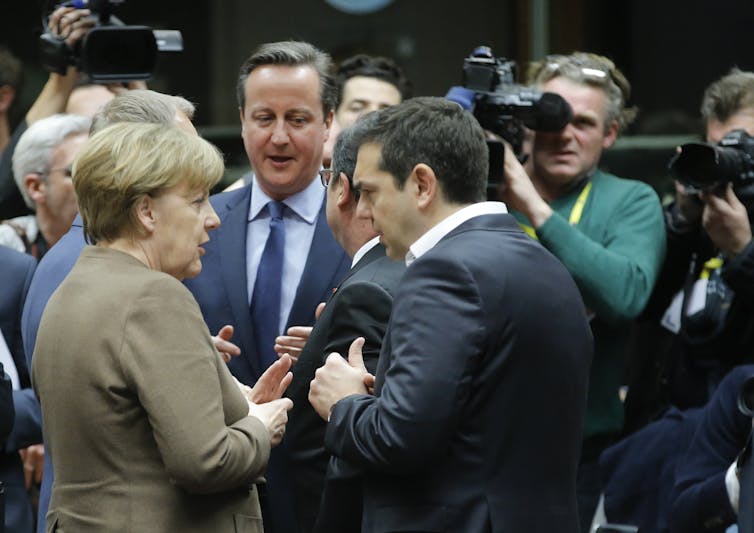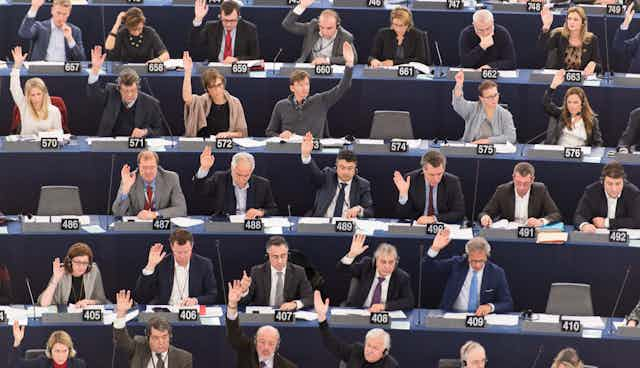One of the constant arguments raised by critics of the EU is that it is “undemocratic”. Those arguing for the UK to vote to leave in the June referendum present it as an opportunity to hand control of British affairs back to the British parliament, the only body with a mandate to make decisions for the country.
On the face of it, the EU has a democratic structure. The European Commission is not elected but it is fully accountable to the European Parliament. And all the EU member states are represented in the Council of Ministers. But does that make it democratic or does it have, as some argue, a democratic deficit?
I suggest that we expect certain characteristics to be present in the structures of any liberal democracy. They should be representative, transparent and accountable. If these characteristics are present then the democratic institutions will normally enjoy legitimacy and authority. So I propose to discuss the presence or absence in the EU of these characteristics.
The EU is undoubtedly representative – more so than many national parliaments, including Britain’s. The European Parliament is made up of MEPs from all 28 EU member states, each elected using various forms of proportional representation (unlike the House of Commons, which is elected through a widely criticised first-past-the-post system).
Smaller states are over-represented in the European Parliament and voter turnout at elections is usually significantly lower than turnout for national government elections – although this is hardly the European Parliament’s fault.
By definition all member states are represented in the Council of Ministers but, if votes are taken, the smaller states again have disproportionate voting rights to prevent their interests being sidelined by the six biggest states, who, combined, have 70% of the EU’s population.
The European Commission itself is made up of civil servants recruited from all the member states, although there are always difficulties in recruiting Commission officials from Britain because so few qualified candidates can speak another European language.
Transparency and accountability
The EU does fall down on transparency. The parliament is transparent enough and I have always found Commission civil servants to be much more open to enquiries than those working in the British government.
Although the Council of Ministers now holds public sessions, the elected governments of the member states are not keen to grant access to debates in the Council, which are held behind closed doors – and where most important decisions are made. These meetings can’t be watched online and minutes are not made public. Not even representatives of the European Parliament can attend.
This is difficult to square with the claim of being democratic, but the remedy mostly lies with the national parliaments. It could and should be their job to call their own government ministers to account for what they do in Brussels, but most national parliaments do a very poor job in this regard – the House of Commons being one of these poor performers.

Another difficulty with ensuring accountability is that, in the absence of significant Europe-wide print or broadcast media, it is up to the national press and broadcasters to fill the public in on what goes on in Brussels. Once again most national level media (especially in the UK) do a patchy, inconsistent and often misleading job.
But there are opportunities for direct citizen involvement in EU matters. Citizens can lobby their own MEPs, or all MEPs if they wish – and it is often individual complaints from citizens that lead to groundbreaking legal judgments by the European Court of Justice. If an EU-wide petition attracts more than 1m signatures from a range of countries, the European Commission must bring proposals about that subject before the European Parliament. The European ombudsman also helps individuals pursue grievances which might involve maladministration by the EU’s institutions.
The verdict
Clearly the EU structure has defects when assessed by the normal standards of Western democracy – but I would argue that the British parliament, with its unelected House of Lords and an unrepresentative House of Commons (in terms of the balance of political parties to votes cast), is even less democratic.
Eurosceptics have for a long time questioned the legitimacy of the EU – but that charge is difficult to sustain. Of course national parliaments have all agreed to pool sovereignty in the EU institutions, but they are entitled to do that and have done so with their eyes wide open. Many even asked their citizens to vote on the decision in a referendum.
What’s more, national governments, through the Council of Ministers, are still the most powerful collective influence in shaping EU decisions – not the European Parliament. They have the right to raise a yellow card about EU legislation, which can cause the Commission to change it.
And the EU is in the process of strengthening the ability of national parliaments to call a halt to EU legislation if they object to it.
So all in all, the EU is, or is at least working to be, a democratic organisation. It has its failings but national governments have just as many – if not more.

